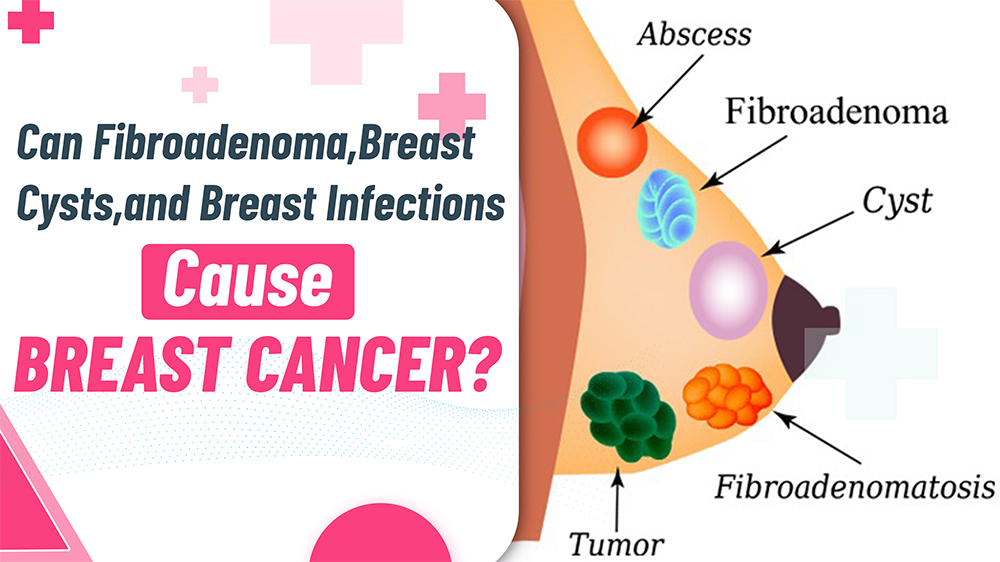The connection between benign breast disease and breast cancer is an important one to make for healthful decisions. Here’s how the most common benign breast conditions — fibroadenomas, breast cysts and breast infections (mastitis) — relate to risk of breast cancer.
Fibroadenoma: Common Benign Breast Lump
Fibroadenomas are benign breast lumps that affect women under the age of 30 most often. Usually they feel smooth, firm, and can be moved under the skin.
Breast cancer risk: The majority of fibroadenomas contribute little or no increased risk for breast cancer. But the somewhat increased risk applied only to complex fibroadenomas, which may have cysts or calcifications. One study reported that women harboring complex fibroadenomas were 3.1 times more likely to develop invasive breast cancer than those without.
Management:Patients should be regularly observed with clinical examination and imaging. If it grows or causes pain, the fibroadenoma can be removed surgically.
Breast Cysts: Sacs (pockets or pouches) of fluid in the breast
Breast cysts are fluid-filled sacs that occur most frequently in women between the ages of 30 and 50. They may be simple (containing fluid), complicated (with debris) or complex (having solid) components.
Risk of Breast Cancer: So far as we know, simple cysts are benign and are not a risk factor for breast cancer. More complex cysts have a slightly higher risk, as it's been shown that they are cancerous 14 to 23% of the time.
Management: The majority of cysts do not need to be treated unless they are painful or bothersome. Ultrasound or biopsy may need to be performed to further assess complex cysts.
Breast Infections (Mastitis) – inflammation of the breast tissue
Mastitis is inflammation of the breast tissue,which causes breast pain, swelling, warmth, and redness. It is most often found in breastfeeding women but may affect others.
Breast Cancer: The risk of breast cancer is not higher in mastitis. But inflammatory breast cancer (IBC)—a rare and aggressive type of breast cancer—can cause symptoms that are similar to mastitis, like redness and swelling. It is important to make a medical distinction between the two.
Management: Treatment is with antibiotics to clear the infection. If therapy does not resolve the symptoms, additional work-up should be performed to exclude IBC.
Do fibroadenoma, breast cysts, and breast infections need Doctor immediately?
When it comes to the health of your breasts, issues like fibroadenomas, breast cysts, and infections can bring on anxiety. Although these health issues are popular, evaluate whether urgent medical help is necessary.
- Fibroadenoma: Although these are mostly harmless growths and don't have to be treated in the emergency room, it's important to get them looked at by a doctor. A test may be ordered, such as a test of a physical exam, ultrasound, or biopsy to confirm the diagnosis and to `rule out any risks.
- Breast Cysts: Although many women have harmless cysts that can resolve without intervention, others may have cysts that require treatment if they are large, painful, or have other negative impacts. If a cyst is painful or worrisome in appearance, you should see a doctor.
- Breast Infection (Mastitis): Signs of infection include swelling, redness, heat, pain, and fever. " "Particularly if that infection starts to spread, even a little bit, to other organs." Antibiotics are often not required for treating the infection, although more serious cases may demand drainage. If you are sick with flu-like symptoms or develop an abscess see a doctor immediately to reduce the risk of complications.
Whenever you find anything unusual related to breast health, its better to have a doctor examine you, so that you have a peace of mind and in case its an issue, you receive timely treatment.
Conclusion
Though benign and common, fibroadenomas, breast cysts and breast infections can have a slightly increased risk for breast cancer if they are of certain types, especially complex fibroadenomas and complex cysts. Mastitis has no effect on the risk of cancer, but it should be accurately diagnosed to avoid confusion with inflammatory breast cancer.
Routine breast self-examination, clinical examination, and appropriate imaging are important in breast surveillance. If you experience anything that seems unusual in your breast, see your healthcare provider for an assessment and peace of mind.
Talk To A Cancer Specialist
Living with cancer is a challenge, but with the proper guidance, timely treatment and a holistic, personalized approach, many patients have the opportunity to enjoy a better quality of life. That is what Dr. Pooja Babbar, a competent cancer specialist and medical oncologist aims to do. A decade in the cure of cancer patients, she has made a mark.
Dr. Babbar believes in evidence-based practice in oncology, so that you get the best treatment that is most suited for your own individual needs. Her specialist knowledge in precision oncology has been particularly beneficial, particularly for complex cancers such as pancreatic cancer. She concentrates on the genetic and molecular composition of each case, which enables a highly individualized and successful treatment program.
However, what this demonstrates is that her dedication to her patients is more than medical care. Dr. Babbar ensures that her patients are emotionally and mentally supported during their treatment journey and provides comfort and companionship. If you or a loved one require cancer treatment, Dr. Pooja Babbar’s skill and caring touch could be the direction you have been searching for.
Call us today to start your road to recovery with a reliable and focused professional.














